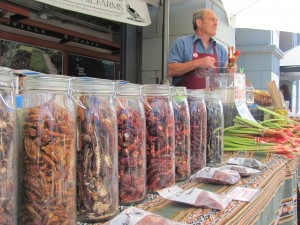
In the dim morning light, enormous vans from the agricultural hubs of California back precariously onto a sidewalk outside the San Francisco Ferry Building. From Yolo County, an older woman and her young assistant unload boxes of tomatoes that will attract a relentless stream of customers all day long. Across the way, a team from Watsonville arranges a colorful display of flowers on five folding tables that will sit nearly empty by market’s end. Next to them, three generations of a family from Petaluma pile their booth high with an assortment of root vegetables.
Underneath an archway along the building’s front entrance, a lone man sorts through his modest wares. Tall and broad-shouldered, he removes three patio umbrellas from his white pickup truck and puts them on the ground to assemble later. Next follow two sensibly compact Ikea stools that hint at the hours of waiting to come. Soon he’ll unpack crates of rhubarbs, lemons, fresh eggs, dried pepper, tobacco — a slapdash assortment of products that will have to do until the warmer weather brings him his signature crop.
The tan, balding man is David Winsberg, a peculiarity even in the world of independent farming. Most of his neighbors at the Ferry Plaza Farmers Market this Saturday morning in early May have been awake for hours, some driving hundreds of miles from farms as large as 200 and 300 acres. Winsberg has zipped 32 miles up Highway 101 from East Palo Alto, where he runs a microfarm out of his backyard.
Though the market doesn’t officially begin until 8 a.m., it’s already bustling. Joggers race by as some of San Francisco’s top chefs weave through the produce stands, looking to get their personal shopping out of the way early. Housewives and young couples trickle past Winsberg’s booth, picking up a pound or two of rhubarb for a pie or a crumble.
Some stop by to say hello — it is only Winsberg’s second market this spring — and to inquire about his famous pimientos de Padrón.
“When are the peppers coming in?” says Roger Shirakawa, a San Francisco real estate agent who has been a dedicated customer for several years.
“Not for about six weeks.”
“I have to wait that long?” Shirakawa counters with mock anger.
“What do you mean ‘that long?’ That’s normal,” Winsberg says, laughing with a booming heartiness. “We just planted a whole bunch, actually, and they’re coming in nicely.”
Winsberg asks Shirakawa about a hand surgery that he had last year, and they discuss the struggles of working out and staying in shape as they get older. After about five minutes, Shirakawa heads on his way, eager for the arrival of those little green veggies in a few weeks’ time. “His peppers are so unique,” Shirakawa tells a reporter standing nearby. “You can’t get them anywhere else.”
For an interaction that has resulted in no exchange of money or goods, Winsberg has spent an awfully long time with Shirakawa. But harvesting that type of customer loyalty is just as essential for Winsberg and his business as the peppers that he grows. An unlikely farmer with the odds stacked against his success, he has carved a niche for himself over the years as “the pepper guy.”
* * *
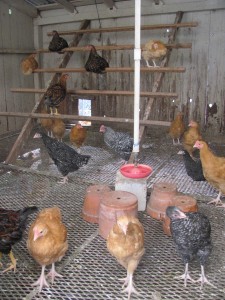
Happy Quail Farms sits two blocks from the University Avenue exit of Highway 101, in the shadow of an Ikea superstore. From the front, it looks like all the other houses on this residential block in East Palo Alto. The backyard is something else entirely: It teems with squawking hens, a community of beehives, a 28,000-square-foot greenhouse and an exuberant family of Border-Aussie mixed breeds. Most of Winsberg’s crops are planted here and on a neighboring lot, an area totaling two acres.
Established before East Palo Alto’s incorporation in 1983, the farm is a thread to a rich agricultural history in a community that has changed so much, particularly in the past three decades: a demographic shift from predominantly African-American to majority Latino; commercial development in the wake of the late ‘90s dot-com boom; revitalization efforts following years of record crime; and encroaching McMansions that have sprouted as new Silicon Valley millionaires emerge.
East Palo Alto was founded in 1849 as Ravenswood, a port city meant to rival San Francisco. It was bypassed altogether by the transcontinental railroad and the land remained mostly undeveloped. In 1916, poultry farmer Charles Weeks bought hundreds of acres and started the Weeks Poultry Colony, which promised participants “a place of higher independence for man in his own garden home.” During the 1930s, many of these estates were turned into flower nurseries by Chinese, Italian and Japanese immigrants seeking cheap farmland in the Bay Area.
Though it once drove the economy, little of this agricultural sector remains after decades of increasing urbanization, as well as competition from industrial farms and foreign imports. Today, Happy Quail is one of the only commercial farms on the Peninsula and Winsberg sees himself as fulfilling a historically important role — keeping alive what he jokingly refers to as “the original growth industry of the Silicon Valley.”
But it was not a path that Winsberg imagined for himself growing up on a 600-acre pepper farm in south Florida. “I had no vision of anything close to this when I got started into my young, independent adulthood,” he says. “I didn’t know what I wanted to do.”
Despite a childhood spent working alongside his father and 150 daily employees on their farm, Winsberg was rebelling against that path by the time he reached his teenage years. “I was never a Future Farmer of America,” he recalls of his high school experience. “Those were the total doofuses.”
Though he enjoyed growing things, Winsberg did not like the tedium of farm work; his participation in the 4H Club had ended in disappointment, after his first cow sold to the local grocery store for pennies over expenses. As he got older, he began to resent having to give up free time for farm chores. “Usually, I would be stuck on something like sitting on the back of a machine, watching some little hole so it didn’t clog,” Winsberg says. “Not the most stimulating work.”
Winsberg attended Earlham College in Indiana for a few semesters, then spent the next few years in a series of odd jobs, often for just weeks at a time. After working as a sewing machine mechanic for Wrangler Jeans, he toiled at a foundry in Wisconsin (“by the end of the week, I was coughing up just black stuff”) and then operated a hot press at a door factory. One summer, he grew tomatoes in rural North Carolina, but didn’t make much money.
In 1978, Winsberg arrived in the Bay Area to join a friend’s glass-blowing studio in Berkeley, but quickly realized that the artistic life was not for him. Working as a baker in the former Bagel Works, he wound up in Palo Alto, where he began raising quail in the small backyard behind his apartment as a hobby and selling the eggs to local sushi bars. When Palo Alto began its farmers market in 1981, Winsberg would go each weekend to offer his quail by special order. (He wasn’t allowed to sell them live.)
Though the quail weren’t particularly popular — he made more money growing a small patch of basil — a couple hundred dollars each week was enough to support Winsberg’s bachelor lifestyle. He quickly realized that this was a job he enjoyed. Unlike the farm in Florida, he could be his own boss, and there was an opportunity to interact with customers. “It’s very self-satisfying,” Winsberg says, “in that you feel like you’re doing something appreciated.”
At the time, Winsberg was working retail at an outdoor clothing store, and it gave him the impetus to branch out on his own. “I thought, ‘You know, I could probably run my own business without that much trouble,’” he remembers. “I could certainly lose money as well anybody else. And I just was fed up with watching other people.”
By now married, Winsberg searched for land to farm in the Bay Area. In East Palo Alto, he found a community of retired Japanese flower farmers who would lease him space in their old greenhouses on a month-by-month basis. Back then, the newly incorporated city still had strong remnants of its agricultural beginnings; down the street, people in the neighborhood were raising pig and sheep.
Winsberg’s original landlord, Ichiro Taro Tanaka, or “Mr. Ichi,” acted as a sort of mentor. Tanaka’s son and daughter had become a computer programmer and a dental hygienist, respectively, so Winsberg was the first person with whom he could share his wisdom and experience. They became good friends, and when Tanaka died of colon cancer a few years later, his wife sold the property to Winsberg, who still lives there.
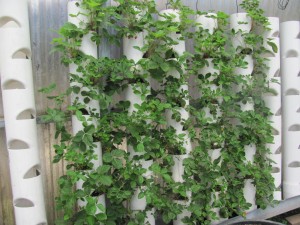
Now a flourishing business, Happy Quail is the sole farm on a residential street with schools at either end. While other small growers nearby have died off or been chased away by rising property costs, Winsberg has been fortunate to expand over the last 30 years. “It was a very synchronistic connection,” he says. “Just as I got started farming, there was this explosion of farmer’s markets and awareness of people about local and organic.”
“This couldn’t happen in other places very easily,” Winsberg adds. He recognizes that he has a survived because of a unique combination of circumstances, including the particularly receptive environment of the Bay Area. “This is sort of a gourmet ghetto here,” he says. “We have a lot of chefs that not only want quality products, but also understand the small farm dilemma… A lot of it is luck.”
* * *
It’s the week before a market, and Winsberg is inside the decades-old chicken coop that has been converted to his workshop. The dark, dusty room is stuffed with gardening supplies and trays of brown paper bags piled all the way to the low ceiling, leaving only a small space near the entrance for work. But it doesn’t matter, because this, as usual, is a solo operation: Winsberg is busy packing one-pound bags of tobacco in preparation for sale in a few days.
“Tobacco kind of gets a bad rap,” he says, weighing a package and then adding a few more dried leaves. “Everyone just says it’s a death drug — and I think cigarettes are certainly a death drug — but tobacco has other uses in society, in the garden, you name it, that aren’t harmful.”
Winsberg has been growing “ceremonial tobacco,” as he calls it, for several years. Recently he has been bringing with it him to farmers markets, to see if it can become another staple. Going around the big tobacco companies has been a source of excitement, Winsberg says, and he refers to the venture his “own little revolution.” Though not extremely popular yet, he might sell up to $100 worth of tobacco in a given weekend, and he’s providing it to a smoke shop in Palo Alto. As a small farmer, Winsberg has to look for products that allow him to be “a big fish in a small pond,” and he hopes that, within the next few years, the tobacco will become a specialty item for which he is known and sought out.
That has been the secret of his success. By becoming a “one-stop pepper shop,” often with products that cannot be found in your local grocery store, Winsberg has carved out a niche in the Bay Area and around the country. (In 2009, he even had some of his peppers appear at one of President Obama’s inaugural celebrations.) But like any small businessman, he initially struggled to establish a presence, and the limited scope of his enterprise still presents considerable challenges in keeping Happy Quail Farms running smoothly.
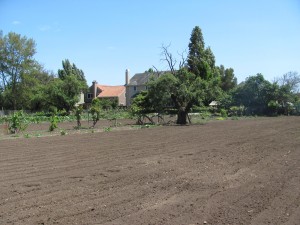
Though they now comprise about half his business, and have garnered him national attention, Winsberg has only been selling Padrón peppers for the last decade. Before that, he spent years experimenting with “fifty or a hundred different things,” including eight types of mint (no one knew what to do with it), half a dozen kinds of thyme, tarragon, and tomatoes (it wasn’t a unique enough product to be profitable). Because of his childhood experiences, Winsberg initially resisted the idea of growing peppers, but after noticing that they were not heavily represented at farmers markets, he decided to try planting bell peppers.
At first, only the red and yellow variety sold. But a growing interest in locally grown product and new farmers markets, including the one at the Ferry Plaza, in the early ‘90s led Winsberg to expand with an increasing number of different colors and specialty strains.
“There’s a lot of unusual peppers,” he says, “We have such a large, diverse clientele that I can sell Russian and Hungarian and Peruvian and Spanish and all these different ethnic types very effectively here, and people are interested in them.”
However, the real explosion came in 2001, following Calvin Trillin’s article on Padrónes in Gourmet magazine. It was a lucky break for Winsberg, who had just started growing the strand after a friend brought him back a packet of seeds from a trip to the region of Galicia in Spain. Looking for customers, Winsberg sent boxes of the peppers, normally served as appetizers, to local chefs, most of whom had no idea what to do with them. But as the demand for Spanish tapas grew, so did the interest in Winsberg’s peppers, and his reach spread with word of mouth among chefs.
In addition to selling at farmers markets throughout the Bay Area, Winsberg supplies restaurants up and down the West Coast, as well as in places like Boston, Hoboken, N.J., Las Vegas and Santa Fe, N.M. “We’re sort of coasting now on our fame,” he jokes.
* * *
The Padrón peppers have given Happy Quail a more established place in the market, but even after 30 years, there are lessons to be learned. “Farming is not a science,” Winsberg says. “It’s a bit of an art and a bit of a gamble as to what works.” He still faces regular threats from competition, the elements, and even the community where he has been based for three decades.
“Part of the trouble for a small farm is just to get enough return per square foot to survive,” Winsberg says. He has had to get creative at times, especially given the limited amount of space he has for planting. Like the titans of technology that surround him, Winsberg is often giving innovative methods a shot, infusing the ancient profession with modern flourishes to stay ahead of the curve.
With only two acres, Winsberg cannot afford to let any of his land lie fallow from year to year, but using chemical fertilizers creates the risk of contamination in the runoff water. He has taken to exploring natural microbial additives to augment soil nutrients. This year, an Italian company sent him a new, undisclosed mixture to test which is meant to increase humic acid production.
“There’s a little bit of chemistry,” Winsberg says. “There’s a little a bit of witchcraft.”
Trying out potential new crops under such restrictions is a gamble, because it is unclear whether giving up space for an unproven product will be a worthwhile investment. Winsberg is growing strawberries for the first time, though instead of planting them in the ground, he has crafted vertical planters out of PVC pipe which he can then lean against the wall of his greenhouse. It is a crafty solution based on an idea he found on the Internet.
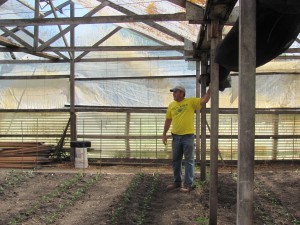
Still, the greatest tool for any small farmer is good old-fashioned customer loyalty. As an experiment this spring, Winsberg did something sort of crazy in the world of see-it, feel-it, take-it-home vegetable shopping: he sold “pepper futures” online, offering the first 20 pounds of Padrónes from this year’s crop for pre-sale through his website. And the even crazier part? They sold out almost immediately.
“We basically have gotten a reputation out of consistency,” Winsberg says. “We do have people lining up for our peppers.” He cites his prime location in East Palo Alto, which is closely matched to the moderate coastal climate of the Padrónes’ native Galicia. The small size of Happy Quail also allows Winsberg to devote more individual attention to the specialty peppers he grows, and ward off recent competition from bigger farms that can afford to undersell him by several dollars on the pound.
How much longer a model like his can last, however, is a serious question for Winsberg. He doesn’t see much of a future for farms like his. “When I get to the stage where I can’t do it any more, I think [my farm] would just be sold to real estate to be developed as a residential plot,” he says.
His place in the community was threatened once before, more than a decade ago, during the construction of the massive shopping center a block away. And the relentless march of progress leaves Happy Quail Farms ever further at odds with a modernizing city. Although East Palo Alto’s planning commission remains fairly supportive of Winsberg’s presence, a neighbor’s recent complaints about the constant crowing of his roosters—the first time in more than 30 years, he says—only serves to highlight how the city’s changes have left him behind.
“I think farming is on its way out of the Bay Area,” Winsberg notes. “And it’s too bad, because the great advantage for me is being right here in my market. … I feel kind of sad to see it all getting converted into asphalt and houses.”
Until then, he’s here to be your pepper guy.
